
Full body health: Ears
A deep dive into ear health with nutrition and lifestyle tips
Chloe Bryce
10/4/2023


What is the Ear?
The ears are located on both sides of the head and are made up of three sections, the outer ear, middle ear, and inner ear. The ear is important for both hearing and balance.
Ear signs and symptoms
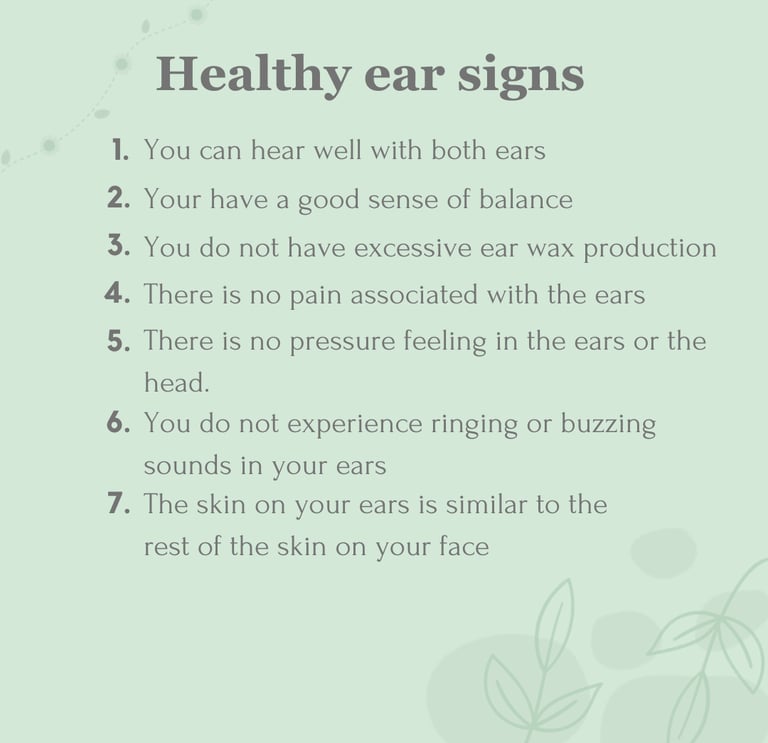

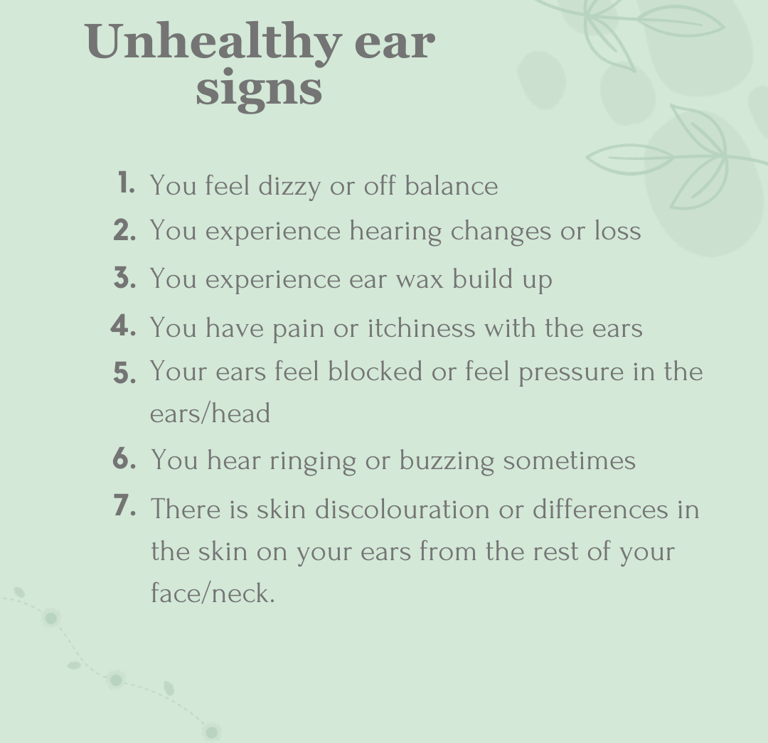

Ear signs and symptoms can indicate that the ears may not be at their healthiest. Not all ear symptoms point to something severe, however, all symptoms or signs should be investigated to have conditions ruled out if they are ongoing. Some ear symptoms are acute and not long lasting, such as a blocked ears during a cold. These are not a concern so long as they resolve with the illness or are not causing intense pain. If you have any signs or symptoms you are concerned about, please have these investigated by a doctor or ENT.
Some symptoms related to the ear include:
Ear pain
Hearing loss
Fullness/blocked feeling of the ear
Headache
Dizziness
Drainage from the ear
Itchiness
Redness of the ear
Ringing of the ears
Excessive wax production
Ear diseases and disorders
Not all of the following disease and disorders affect only the ears and many are impacted by other factors other than just the ears. Some symptoms that impact the ears are caused by diseases and disorders that involve other body systems.
Ear infections of the outer, middle or inner ear
Hearing loss
Vertigo
Tinnitus
Swimmer's ear
Glue ear
Otosclerosis
Meniere's disease
Labyrinthitis
Ear wax build up
Acoustic Neuroma
Autoimmune inner ear disease
Hyperacusis ear disease
Presbycusis ear disease
Nutrition for ear health
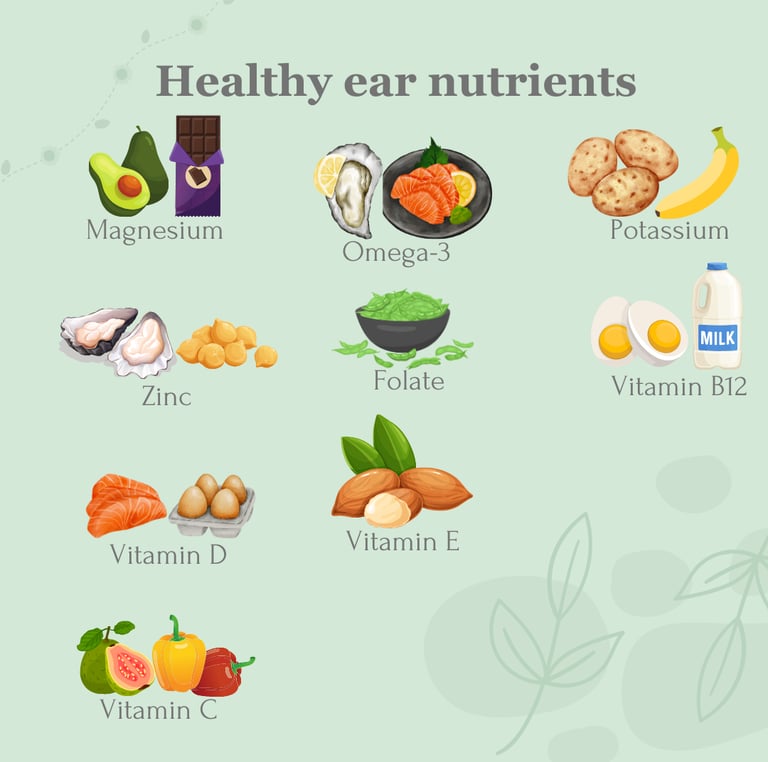

Nutrition can play an important role in optimizing ear health and supporting ear function, as well as aiding in symptom management or improvement in some ear conditions. The nutrients and food listed here is general advice for supporting ear health. It is always best practice to include wholefood sources of these foods over supplements. Wholefood sources often have other nutrients that aid in absorption or benefit the recommended nutrients. Supplements should only be taken under the guidance of a qualified health professional. If you have a specific symptom or condition you would like help with. Please consult a qualified health professional. If you would like to see if I can help you, please either book a discovery call or email me.
Magnesium: Magnesium can help protect the ear and the tiny hair cells within the inner from noise related hearing loss. It does this by reducing free radical damage that is produced within the ear during periods of loud noise. Magnesium may also help reduce the severity of tinnitus symptoms, particularly in those with noise-induced hearing loss.
Food sources: Pumpkin Seeds, Chia Seeds, Almonds, Boiled Spinach, Cashews, Dark Chocolate, Cacao Powder, Avocado.
Omega-3: Omega-3s are well known for their anti-inflammatory benefits but did you know they can play an important role in preventing hearing loss? Growing research is showing that those with higher omega-3 intakes, particularly DHA, has less difficulty hearing or age-related hearing issues. While the link between omega-3 and hearing is not yet confirmed, it is believed it may be to do with the benefical impacts omega-3 has on the vascular system. The ears rely on good blood flow and omega-3 has plaque reducing properities, boosting artery health.
Food sources: Salmon, Mackerel, Tuna, Herring, Sardines, Cod Liver Oil, Oysters, Anchovies, Caviar, Flaxseeds (ALA), Chia Seeds (ALA), Walnuts (ALA), Soybeans (ALA). Small amounts from: Organic pasture raised eggs, grass feed meat.
Potassium: Potassium is a key mineral in regulating fluids in the body and tissues. The inner ear contains fluid that helps with balance and is needed for hearing. This fluid is rich in potassium and other minerals. As we age, the potassium levels in the inner ear and the rest of the body decline. This can increase the risk for age-related hearing loss.
Food sources: Bananas, Apricots, Dates, Cooked Spinach, Cooked Broccoli, Potatoes, Leafy Greens.
Zinc: Zinc is a potent antioxidant that is vital for immune health. Zinc may be helpful in preventing and reducing the duration of respiratory associated viral infections, such as rhinovirus (general cold). Often these illnesses are associated with ear pressure, pain or fluid build up. Zinc has also been shown to help improve tinnitus in noise induced hearing loss associated tinnitus. Zinc supplementation without advice is not recommended for extended periods due to its competitive nature with copper.
Food sources: Oysters, Beef, Oats, Pumpkin Seeds, Turkey Breast, Legumes, Cashews, Cheese, Dark chocolate.
Folate: Folate is an important antioxidant and has a role in reducing free radical damage, similar to magnesium. Folate also is involved with the metabolism of homocysteine. Homocysteine is associated with inflammation, reduced blood flow and hearing loss, particularly as we age. Lower levels of folate has been associated with hearing loss, so it is important to ensure you are getting enough folate in our diet for both your hearing and general health!
Food sources: Beef Liver, Boiled Spinach, Rice, Asparagus, Brussel Sprouts, Romaine Lettuce, Avocado, Broccoli and Kidney Beans.
Vitamin B12: Vitamin B12 has similar roles to folate. Vitamin B12 has an important role in homocysteine metabolism. This helps to reduce inflammation levels improve blood flow and may help reduce hearing loss and improve tinnitus symptoms. Vitamin B12 deficiency is associated with hearing loss and tinnitus.
Food sources: Beef Liver, Clams, Nutritional Yeast, Salmon, Tuna, Beef, Milk, Yoghurt, Cheese, Eggs and Turkey.
Vitamin D: Vitamin D is such an important nutrient for so many reasons. Vitamin D plays a role in immune health and a stronger immune system can reduce the severity of illnesses that may impact the ears. Vitamin D is also very important in bone health, including in strengthening the 3 tiny bones in our ears. If the bones in our ears become weak or softer, it can results in hearing loss. Low levels of Vitamin D has been associated with hearing loss, tinnitus, and vertigo.
Food sources: Cod Liver Oil, Salmon, Tuna, Sardines, Beef Liver, Egg Yolks, Some Mushrooms, Fortified foods.
Vitamin E: Vitamin E is a strong antioxidant which is why it can be helpful in improving noise-related hearing loss. Studies have shown Vitamin E, in conjunction with other antioxidants or on its own, can help prevent noise-related hearing loss before an acute noisy situation or help improve noise-related hearing loss post acute noisy environment.
Food sources: Sunflower seeds, Almonds, Peanuts + Peanut Butter, Avocados, Spinach, Kiwi Fruit, Salmon and Pumpkin.
Vitamin C: Vitamin C acts to help protect our ears from hearing loss by preventing and reducing free radical damage via its antioxidant roles! This is very similar to Vitamin E and Magnesium. Vitamin C can benefit the immune system as well which may help reduce the severity and duration of virus-related ear symptoms.
Food sources: Kakadu Plums, Capsicum, Guava, Rockmelon, Kiwi Fruit, Kale, Papaya, Broccoli, Strawberries and Oranges.
Lifestyle for ear health
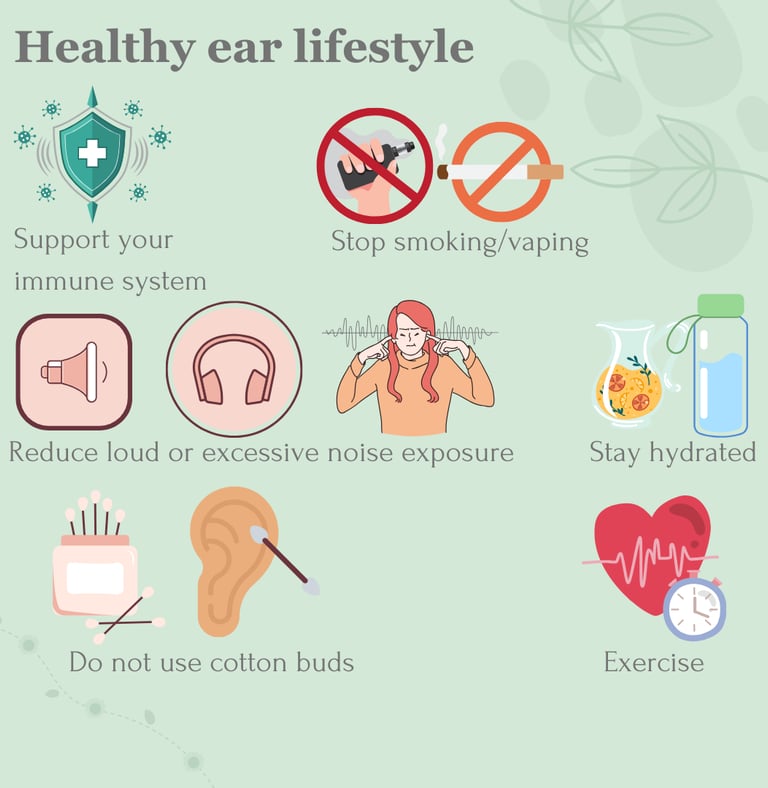

This advice is general in nature and is intended for informational purposes only. This advice does not consider your personal circumstances and should not be used as a substitute to personal professional medical advice. If you are concerned about any signs or symptoms you are experiencing, please see a qualified health professional. If you would like personal nutritional and lifestyle advice, please book an appointment. If you choose to rely on any information provided on this site, you do so solely at your own risk.
References
https://specialtyphysicianassociates.com/news/nutrients-that-can-support-your-hearing-health/
https://www.miracle-ear.com/blog-news/vitamins-for-ear-health
https://salyerhearingcenter.com/feed-your-ears-nutrition-hearing/
https://www.aussiedeafkids.org.au/maintaining-good-ear-health-1.html
https://bmcresnotes.biomedcentral.com/articles/10.1186/s13104-019-4809-8
https://ejo.springeropen.com/articles/10.1186/s43163-022-00199-w
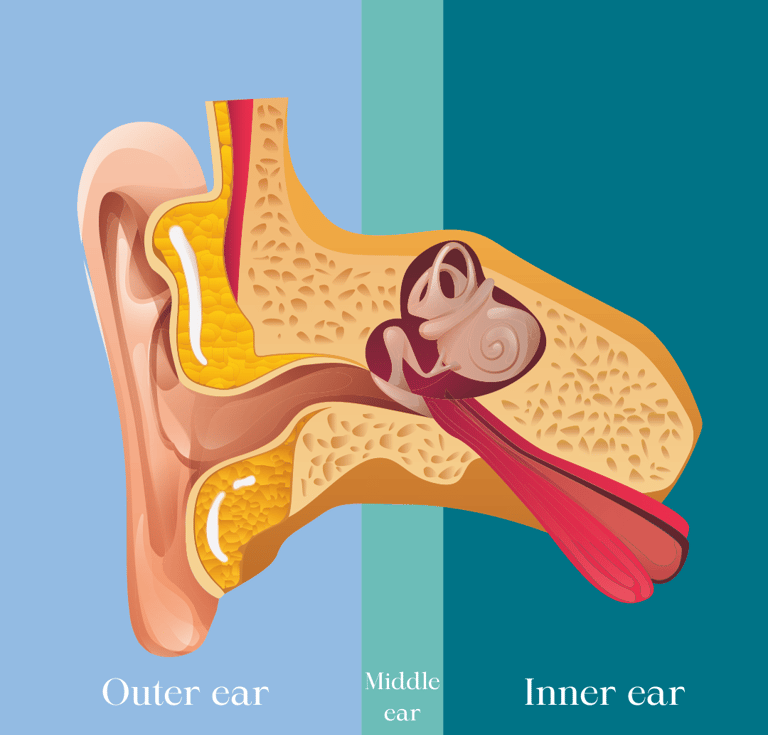

The outer ear is made up of the pinna (the part of the ear that is external), the ear canal and the ear drum. The shape of the pinna helps to guide sound into the ear canal and ear drum. The middle ear is made up of the ossicles and the eustachian tube. The ossicles are 3 tiny bones called the malleus, the incus and the staples. When the ear drum vibrates in response to sound waves, the ossicles vibrate as well and these vibrations head into the inner ear. The eustachian tube connects the middle ear to the nose and throat. The inner ear is made up of the cochlea and the vestibular system. The cochlea is the snail shell like structure you see in the diagram above. The cochlea receives the vibrations of sound from the ossicles and transforms them into nerve impulses which get sent to the brain via tiny hair cells to be interpreted and allows us to understand what we are hearing. The vestibular system is made up of 3 canals that are fluid filled. When you move your head, the fluid in the canals move and help tell your brain where your head is in space and which way you head is moving. The vestibular system is vital for balance.
Lifestyle can play an important role in eye health and prevention of eye related diseases. These lifestyle tips can take some time to implement and create the habit, so go slowly and implement the ones that work best for you or feel achievable at the moment. This is not an exhaustive list of lifestyle habits to support eye health, but it is a good place to start.
Support your immune system: As discussed throughout the "Nutrients for ear health" section, when we support our immune system, we are more likely to recover quicker from illness, experience less severe symptoms and get sick less. This can reduce ear symptoms, like blocked ears, that are associated with upper respiratory infections such as the common cold.
Stop smoking or vaping: Smoking is a huge risk factor for hearing loss. The impact isnt just for those who directly smoke, breathing in second-hand smoke or smoking smoking while pregnant can impact hearing for people and fetuses alike. Smoking also puts you at higher risk for things like tinnitus, dizziness and vertigo. Smoking can restrict blood flow, and as discussed previously, this can greatly impact hearing and ear health. It also increases oxidative stress and damage, hence why smokers require a greater amount of antioxidant intake in their diet. Smoking is associated with higher incidences of ear infections in both the adult population and child population who are breathing in second-hand smoke. Vaping is a relatively new habit, thus there is currently insufficient research to determine the exact impact vaping has on ear health, however, vapes do contain some of the alarming chemicals that are found in cigarettes, and even more terrifying chemicals. This was looked at further in our deep dive into brain health. For best health practice, it would be best to avoid vaping.
Reduce loud or excessive noise exposure: Loud noise exposure, whether this be a one off, really loud noise, or prolonged and repeated loud noise exposure, has the potential to cause and lead to hearing loss. Noise induced hearing loss happens when the hair cells within the inner ear become damaged and die. The hair cells become damaged due to loud noise as this increases oxidative stress. Unfortunately these hair cells cannot regenerate. Sometimes, when there is an extrememly loud noise, the ear drum can burst or the little bones in the middle ear can fracture or damaged, this can also cause hearing loss that can be permenant.
Stay hydrated: We all know how important staying hydrated is for our overall health and wellbeing, but it is also incredibily important for our ear health. The cochlea is a fluid filled structure within the inner ear and is greatly impacted by dehydration. When you are dehydrated, the cochlea may become impacted and can lead to symptoms such as ringing in the ears, dizziness, and loss of balance.
Avoid cotton buds: Not using cotton buds in your ears is something you have probably heard of before. Using cotton buds in your ears may feel like it will help keep your ears clean or help with a symptom you are experiencing, however, it is a risk factor for trauma, ear wax impaction or infection. The ears are actually self cleaning and will expel ear wax themselves. However, some people do have issues with ear wax consistency or production and if this is the case, it is best to speak to a doctor or ENT to discuss the cause and resolution of this. Trying to "clean out" your ears at home with cotton buds is far more likley to create more issues rather than resolve them.
Exercise: Again, another habit we know is so good and important for our overall health, but what impact could exercise possibly have on ear health? Actually quite a big one. Studies have shown that those who do not exercise or have poor physical activity habits, are more likely to experience hearing loss and cochlea degeneration. Exercise can help improve the vascular system, and thus blood flow. We already know how important good blood flow is for the ears and hearing health. Exercise is also important for brain health, which plays an important role in the interpretation of nerve impulses from the ears to allow us to know what we are actually hearing.
Let's talk
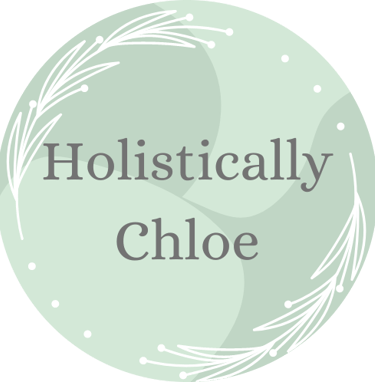

Holistically Chloe would like to acknowledge the traditional owners of the land throughout Australia. We acknowledge the Bunurong people, the traditional custodians of land we gather on today. We pay our respect to elders past and present and extend that respect to all Aboriginal and Torres Strait Islander peoples today.
© Holistically Chloe
